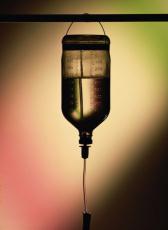National Institutes of Health
- The primary NIH organization for research on Hypoglycemia is the National Institute of Diabetes and Digestive and Kidney Diseases
 A service of the U.S. National Library of Medicine
A service of the U.S. National Library of Medicine  National Institutes of Health
National Institutes of Health
Did you know you have sugar in your blood? Your body needs glucose, a form of sugar, to have enough energy. After you eat, your blood absorbs glucose. If you eat more sugar than your body needs, your muscles and liver store the extra. When your blood sugar begins to fall, a hormone tells your liver to release glucose. In most people, this raises blood sugar. If it doesn't, you have hypoglycemia, and your blood sugar can be dangerously low. Signs include
Hypoglycemia is usually a side effect of diabetes medicines. Eating or drinking something with carbohydrates can help. If it happens often, your health care provider may need to change your treatment plan.
You can also have low blood sugar without having diabetes. In that case, your health care provider will try to find the cause using laboratory tests to measure blood glucose, insulin and other chemicals that play a part in the body's use of energy.
References and abstracts from MEDLINE/PubMed (National Library of Medicine)
